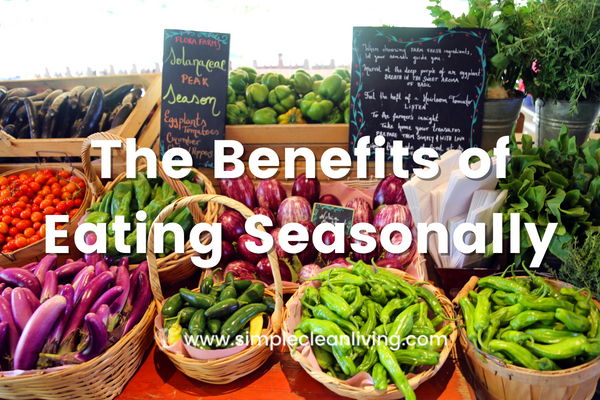Notice: I’m an affiliate for Amazon as well as other companies. Any links in this article may be affiliate links. I always appreciate it if you purchase something using my affiliate links. Doing so helps me to raise a little extra money that pays for the costs of running this site. And it allows me to continue bringing you quality content, all without costing you a thing! Thanks!
It’s spring here in sunny South Carolina and for us, the growing season has begun. This is the time of year that local farmer’s markets begin opening around my town. And that means plenty of freshly grown local produce to bring home. There is something wonderful about eating seasonally!
Today we live in a time when most produce is shipped into the US from around the world. And much of it is available all year. But that wasn’t always the case. A little over a century ago, most people ate produce seasonally, because that is when it was available to them. It was common for every family to have a garden in the backyard. And they would typically share with neighbors. What wasn’t consumed was preserved through canning or freezing to be enjoyed at a later time.
But now that so much produce is available all the time, we’ve lost track of the benefits that come from eating seasonally. Although purchasing the produce from your local supermarket is convenient, purchasing locally allows you to experience more benefits. I always recommend buying from local farmers first!
What are the benefits of eating seasonally?
Energy Rich
We don’t often think about the energetic value of the foods we eat. But food energy DOES matter! Because the body is sensitive to so many things, low-energy, processed “junk” foods can be a big problem. Highly processed foods can in fact deplete us even more. Eating fresh, whole foods is definitely a better option. In general, these foods are richer in energy and will not deplete us energetically…unless a food allergy or intolerance is present. But there are other benefits you can expect from eating seasonally as well!
Freshness
When you are eating seasonally, the fruits and vegetables you buy will be much fresher. This is true for both store-bought produce as well as produce purchased from local farms. When you make the choice to purchase locally, however, the produce will be the freshest you can buy. Farmers will often pick produce the morning that they sell it. Store-bought produce still must often travel to reach your local store. That time spent in shipping reduces freshness.
Food has better flavor
Have you ever tasted a store-bought tomato and were disappointed because there wasn’t a whole lot of flavor? A freshly picked tomato is juicy and so full of flavor that you can tell the difference. There is no comparison between the taste of produce purchased at the store and that was grown in your backyard or by a local farmer. Produce that has been picked for your grocery store is typically picked early and chilled during the shipping process to help maintain freshness.
Richer in nutrients
There is a growing problem with nutrient deficiencies in the US. More and more people are experiencing the symptoms of nutrient deficiencies. Yet they remain completely unaware that these deficiencies are causing them to have symptoms. Because of that, the need to consume nutrient-rich foods is vitally important for most people. Unfortunately, much of the store-bought produce you purchase may have lower nutrient content than produce that is purchased from local farmers. Conventional produce is not allowed to ripen fully before it is shipped across the country or across the world. The longer many fruits and vegetables stay in storage, the more vital nutrients are allowed to degrade. The nutrient content of what is sold at the stores is significantly lower than produce fresh off the vine or from the field.
Eating seasonally is cheaper
In-season produce is plentiful. And during these times typically costs significantly less than out-of-season produce. And that can definitely benefit your wallet! If you purchase locally in-season produce, it doesn’t have the same shipping expenses that conventional store-bought produce does. And that allows you to save money.
Eating seasonally is better for the planet
When you purchase local, in-season produce, there is less of a demand for fresh fruit and vegetables to be shipped from overseas. This is ultimately a more sustainable choice and better for the environment as well.
If you want the healthiest, freshest, most flavorful produce, choose some from a local farmer. It’s better for you and for the environment!
Here’s the seasonal growing schedule in the US:
Spring seasonal produce includes:
- Apples
- Apricots
- Asparagus
- Avocados
- Bananas
- Broccoli
- Cabbage
- Carrots
- Celery
- Collard Greens
- Garlic
- Kale
- KIwifruit
- Lemons
- Lettuce
- Limes
- Mushrooms
- Onions
- Peas
- Pineapples
- Radishes
- Rhubarb
- Spinach
- Strawberries
- Swiss Chard
- Turnips
Summer produce for eating seasonally
- Apples
- Apricots
- Avocados
- Bananas
- Beets
- Bell peppers
- Blackberries
- Blueberries
- Cantaloupe
- Carrots
- Celery
- Cherries
- Corn
- Cucumbers
- Eggplant
- Garlic
- Green Beans
- Honeydew Melon
- Lemons
- Lima Beans
- Limes
- Mangos
- Okra
- Peaches
- Plums
- Raspberries
- Summer squash
- Watermelon
- Zucchini
Fall Seasonal Produce:
- Apples
- Bananas
- Beets
- Bell peppers
- Broccoli
- Brussel sprouts
- Blueberries
- Cabbage
- Carrots
- Cauliflower
- Celery
- Collard greens
- Cranberries
- Garlic
- Ginger
- Grapes
- Green beans
- Kale
- Kiwifruit
- Lemons
- Lettuce
- Limes
- Mangos
- Mushrooms
- Onions
- Pears
- Peas
- Pineapple
- Potatoes
- Pumpkins
- Radishes
- Raspberries
- Spinach
- Sweet potatoes
- Swiss chard
- Winter squash
Winter produce for eating seasonally:
- Apples
- Avocados
- Bananas
- Beets
- Brussel sprouts
- Cabbage
- Carrots
- Celery
- Collard greens
- Grapefruit
- Kale
- Kiwifruit
- Leeks
- Lemons
- Limes
- Onions
- Oranges
- Parsnips
- Pears
- Pineapples
- Potatoes
- Pumpkins
- Rutabagas
- Sweet potatoes
- Swiss chard
- Turnips
- Winter squash
I will openly admit that I used to be a big junk food junkie! And many find themselves addicted to junk food. It is easy to begin relying on it to comfort yourself when you are feeling overwhelmed (which happens a lot). Eating a diet of mostly highly processed food left me morbidly obese, struggling with anxiety and panic attacks regularly, and feeling downright crappy!
I had to commit to loving myself enough to begin discovering the foods that would really help my body to thrive. Now, I do my best to choose foods that will fuel my body…instead of depleting me! I cook from scratch 85% of the time and incorporate lots of fresh, seasonal fruits and vegetables each day! I feel a big difference in my energy levels when I’m eating energy-rich foods. And I can also feel the difference in not-so-great ways when I’m eating more processed foods. And I feel the best when I incorporate lots of fresh, seasonal produce that I’ve bought locally. It just tastes and feels better for my body!




